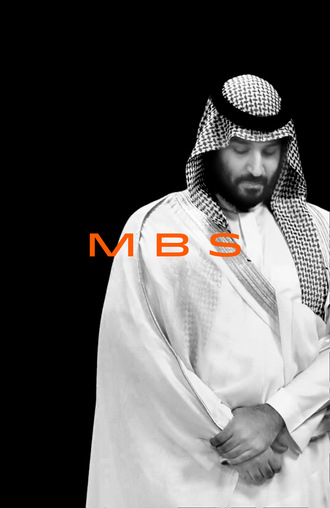
MBS

MBS
THE RISE TO POWER OF
MOHAMMED BIN SALMAN

Ben Hubbard

Copyright
William Collins
An imprint of HarperCollinsPublishers
1 London Bridge Street
London SE1 9GF
WilliamCollinsBooks.com
This eBook first published in Great Britain by William Collins in 2020
Copyright © Ben Hubbard 2020
Cover design by Christopher Brand
Cover photograph by Ricardo Mazalan/AP/Shutterstock
Ben Hubbard asserts the moral right to be identified as the author of this work
A catalogue record for this book is available from the British Library
All rights reserved under International and Pan-American Copyright Conventions. By payment of the required fees, you have been granted the non-exclusive, non-transferable right to access and read the text of this e-book on-screen. No part of this text may be reproduced, transmitted, down-loaded, decompiled, reverse engineered, or stored in or introduced into any information storage and retrieval system, in any form or by any means, whether electronic or mechanical, now known or hereinafter invented, without the express written permission of HarperCollins
Source ISBN: 9780008340551
Ebook Edition © March 2020 ISBN: 9780008340575
Version: 2020-02-19
Dedication
To my parents,
for always keeping so many books around
Epigraph
And let it be noted that there is no more delicate matter to take in hand, nor more dangerous to conduct, nor more doubtful in its success, than to set up as a leader in the introduction of changes.
—NICCOLÓ MACHIAVELLI, The Prince
Ask the young. They know everything.
—JOSEPH JOUBERT
CONTENTS

Cover
Title Page
Copyright
Dedication
Epigraph
Author’s Note
Introduction
THE KINGDOM
ARRIVALS
CORONATION
YOUNG PRINCE RISING
COURTING OBAMA
NO SUCH THING AS WAHHABISM
GRAND VISIONS
A ROLE FOR JOURNALISM
THE TWO MOHAMMEDS
MBS’S WAR
SO-CALLED ALLIES
A TRUE FRIEND IN THE WHITE HOUSE
A STAB IN THE BACK
A JOURNALIST AT WORK
LORD OF THE FLIES
AN INSIDER IN EXILE
DRIVING A LIFE
A HOLOGRAM FOR THE CROWN PRINCE, PART ONE
WE HAVE REASON TO BELIEVE OUR PRIME MINISTER HAS BEEN KIDNAPPED BY SAUDI ARABIA
GUESTS OF THE KING
A NIGHT AT THE OPERA
CHARM TOURS
BLACK PANTHER
OH CANADA
LOOKING FOR LOVE
A HOLOGRAM FOR THE CROWN PRINCE, PART TWO
AFTERWORD
Picture Section
Footnote
Notes
Index
Acknowledgments
About the Author
About the Publisher
AUTHOR’S NOTE

THIS WORK IS based on hundreds of interviews in a half-dozen countries over six years; a range of English, Arabic, French, and Turkish publications, news accounts, and social media posts; and my experiences during multiple trips to Saudi Arabia between 2013 and 2018. It is a work of nonfiction, and in no place have I altered names, details, or facts to hide the identities of sources or enhance the narrative. The reader can find citations in the endnotes, as well as supplementary information.
The realities of working as a foreign journalist in Saudi Arabia changed substantially over the course of the events depicted in this book—first for the better, then for the worse. In addition to Saudi Arabia’s treatment of Jamal Khashoggi, the kingdom has imposed travel bans on thousands of Saudis and jailed and prosecuted citizens for expressing themselves online or communicating with foreign journalists. This has led me to err on the side of caution with the identification of Saudi sources, granting many anonymity. I am aware that this affects the transparency of the work, but I prefer that over endangering those who chose to share their stories, thoughts, and information with me.
For the rendering of Arabic names and phrases in English, I have followed no standard rules, but tried to ensure clarity for the nonspecialist reader.
Mohammed bin Salman declined to be interviewed for this book.
INTRODUCTION

BY THE TIME the young prince who was running the Arab world’s richest country was due to speak, a standing-room-only crowd of international investors, businessmen, millionaires, and billionaires had packed a luxurious hall under massive crystal chandeliers to await his appearance. It was fall 2017, and all had come to Riyadh, the capital of Saudi Arabia, for a lavish investment conference that had unofficially been dubbed “Davos in the Desert” to give it the same ring of exclusivity and consequence as the annual meet-up of global powerbrokers in the Swiss Alps. This conference, however, had a different goal: to convince the assembled moneymen that the time was now to bet big on Saudi Arabia.
Over the previous days, the kingdom had worked hard to convince its thousands of guests that any preconceptions they had about Saudi Arabia were not true, or were at least on their way to not being true. The country was changing, they were told, opening up and shedding its past as a hyper-conservative, insular Islamic kingdom.
Saudi Arabia had long been known for two things: oil and Islam. The first was pooled in such great quantities under the kingdom’s sands that it had turned its royal family, the Al Saud, into one of the world’s richest dynasties, giving the country that bore their name a geo-strategic importance it otherwise would have lacked. The massive oil wealth had shaped the Saudi economy, giving an elite class of princes and businessmen tremendous wealth while most citizens either stayed home or earned salaries from government jobs that paid well and often required little work.
The official Islam of the kingdom was not any Islam, but Wahhabism, the ultraconservative and intolerant interpretation that was woven into the kingdom’s history. It taught the faithful to be wary of non-Muslim “infidels,” saw murderers and drug dealers beheaded in public squares, and deprived women of basic rights. The kingdom was far stricter than most other Islamic societies, but its status as the guardian of Islam’s holiest sites, in Mecca and Medina, gave it unique clout among the world’s 1.8 billion Muslims.
Saudi leaders knew their kingdom’s troubled reputation, so the conference had been carefully planned to challenge how attendees saw the country. Guests had dined on grilled lamb and chocolate truffles at private dinners hosted by princes and officials in opulent homes with swimming pools, art galleries, and hidden liquor cabinets. Women featured prominently in the program and mingled freely with men in the coffee shop of the Ritz-Carlton, with no obligation to cover their hair, as they had to elsewhere.
Slick presentations courted investors for grand initiatives. Saudi Arabia would become a global shipping and transport hub. Entertainment options for its 22 million citizens would proliferate, with amusement parks, cinemas, and concert venues, all of which had long been forbidden for religious reasons. Tourism would boom, with the development of long-neglected historic sites and the creation of a world-class eco-resort in the Red Sea. And in case anyone doubted that the changes were real, the kingdom was finally going to reverse the regulation that had long stood as the primary example of its oppression of women: In June 2018, it would let them drive.
The message was clear: Titanic changes were afoot in Saudi Arabia, and the man driving them was a mysterious, workaholic son of the king, named Mohammed bin Salman. He was 32 years old and out to remake the kingdom—and the wider Middle East—as fast as he could.
Seated in plush chairs or on the tan carpet, the conference attendees had come to take the measure of the young prince. Was he for real? Was he a visionary leader who would drag Saudi Arabia from its conservative past or a rash upstart who would drive it into the ground?
Murmurs raced through the hall as a side door opened, and the prince appeared. He wore the standard outfit for Saudi men: a long white gown with snaps down the front, known as a thobe; a red-and-white-checkered headdress held in place with a black cord; and black sandals. He was chubby, due to his fondness for fast food, and he wore a scruffy beard that climbed high up his cheeks, telegraphing that he was too busy working to waste time on superfluous grooming. Flanked by aides and trailed by photographers and television cameras, he ascended the stage and sank into a white armchair.
He had emerged from obscurity less than three years before, a prince among thousands of princes, who had charmed and plotted his way to the top of the kingdom’s power structure. When his elderly father, King Salman, ascended to the throne in 2015, he gave his son oversight of the kingdom’s most important portfolios: defense, economy, religion, and oil. Then, shoving aside older relatives, he became the crown prince, putting him next in line to the throne. His father remained the head of state, but it was clear that Prince Mohammed was the hands-on ruler, the kingdom’s overseer and CEO.
To distinguish him from the mass of his royal relatives, Saudis and Saudi watchers referred to him by his initials, MBS. He was a large man with a presence that filled up rooms. In public and private, he dispensed with the formal Arabic customary among Arab leaders and spoke rapidly in dialect, gesticulating with his large hands, his voice deep like a growl. He often overflowed with energy, his thoughts coming so fast he interrupted himself mid-sentence. During audiences with foreign officials, he would sometimes hold forth on his vision for the future for an hour or more without pausing for questions. One foreign official recalled that the prince’s leg never stopped bouncing during their meeting, making him wonder if the prince was nervous or on some kind of stimulant.
On stage that day, MBS addressed the moderator in English to show his foreign guests that he could, then switched to Arabic to unveil yet another hyper-ambitious project: NEOM, a city that would rise from an isolated plot of desert near the Red Sea, where businessmen would write the laws and entice the world’s top minds to innovate on Saudi soil. Planning for a post-carbon future and taking advantage of the Saudi sun, the city would be powered by solar energy and staffed by so many robots that they might outnumber the human inhabitants. NEOM, MBS said, would cost $500 billion and be a place for “dreamers.” It was not an economic development project, but a “civilizational leap for humanity.”
The lights dimmed and the audience watched a flashy video about the proposed city. Then the moderator, a foreign woman journalist, asked whether the kingdom’s religious conservatism would hinder a project so focused on the future. MBS dismissed the idea that intolerance was part of Saudi history, insisting that the kingdom sought to engage with the rest of the world for the benefit of everyone.
We were not like this in the past. We are only returning to what we were, a moderate, balanced Islam that is open to the world, and to all the religions, and to all traditions and peoples.
Seventy percent of the Saudi people are younger than 30 years old. With all truthfulness, we will not waste thirty years of our lives dealing with any extremist ideas. We will destroy them today, immediately. We want to live a natural life, a life that translates our religion into tolerance and our good customs and traditions, and we’ll live with the world and contribute to the development of the whole world.
Such a vow had never been made in public by a Saudi leader. The audience erupted in applause.
TWO WEEKS LATER, a harsher reality set in. Over a few days, officials from the Royal Court and the secret police rounded up hundreds of Saudi Arabia’s wealthiest and most powerful men, including a number of MBS’s royal relatives—and even some who had attended his wedding. They were stripped of their cellphones, guards, and drivers and locked in the Riyadh Ritz-Carlton, turning the investment conference’s luxury setting into a five-star prison. There was a new future on the way for Saudi Arabia, and it would involve more than robots and women driving.
The government said the detentions were a crackdown on corruption, and many Saudis welcomed the idea. They had long watched princes and businessmen muscle their way into lucrative contracts or run other schemes to siphon fortunes from the government’s coffers. Some of those locked in the Ritz were among the worst offenders.
But other well-known offenders remained free, raising doubts about the crackdown’s true goals. Other aspects were strange, too. While the arrests were taking place, the committee leading the investigations was announced. It was led by MBS, the source of whose own wealth had never been scrutinized. Hadn’t the prince himself spent nearly a half-billion dollars on a yacht? What about his French château, hailed in magazines as “the world’s most expensive home”? Later, a proxy buyer said to be acting for MBS plunked down $450.3 million for a Leonardo da Vinci painting.
The detainees in the Ritz were told they were guests of the king, but their treatment was far from benign. As their ordeal dragged on, their loved ones cautiously reached out to me to curse MBS. One was from a storied Saudi business family who said she had heard nothing from her detained relative for weeks until he suddenly called.
“I am fine,” he told her, convincing her that he was anything but.
The call ended in three minutes.
She saw the crackdown as a ploy by MBS to commandeer the kingdom’s capital for his own ends while tarring the reputations of all who might challenge him.
“He is a psycho. He has spite. He wants to break people. He doesn’t want anyone to have an honorable name but him,” she told me. “He is a devil, and the devil is learning from him.”
IN ONLY A few years, Mohammed bin Salman had become the dominant force in Saudi Arabia and one of the most dynamic and scrutinized leaders in the world. His prominence was not preordained. For much of his life, he was lost in the crowd of richer, more experienced princes and low down the totem pole in a family where seniority reigned. So how did he do it? This book tells the story.
MBS could prove to be Saudi Arabia’s most momentous ruler since his grandfather founded the kingdom eight decades ago and made it a key partner of the United States. MBS’s rise came six decades after his grandfather’s death, during a time of serious threats to the Arab world’s richest country. The oil price was crashing, sapping its economy. Two-thirds of its citizens were under age 30, scrambling for jobs and chafing under strict social restrictions. In the wider Middle East, the jihadists of the Islamic State were rampaging through Iraq and Syria and bombing the kingdom. Iran, Saudi Arabia’s nemesis, was taking advantage of the region’s turmoil to expand its influence.
Exacerbating these challenges were doubts about the commitment of the kingdom’s most important ally: the United States. President Barack Obama had little fondness for the place. Before becoming president, he had dismissed Saudi Arabia as a “so-called” ally and criticized its exportation of Wahhabism for fueling intolerance in the Muslim world. His administration would forge a nuclear deal with Iran while Congress passed legislation allowing Americans to sue Saudi Arabia over the terrorist attacks of September 11, 2001; fifteen of the nineteen hijackers, as well as their leader, Osama bin Laden, were Saudis. Both moves were stinging slaps to a kingdom that depended on the United States for protection, spent billions of dollars on American weapons, and expected a certain loyalty in return.
MBS would attack all these problems and more, plunging the kingdom into a war in Yemen; launching a plan to overhaul the economy; charming executives from Wall Street, Hollywood, and Silicon Valley; detaining another country’s prime minister to force his resignation; and forging a strong and unlikely bond with President Donald Trump and his son-in-law, Jared Kushner. Inside the kingdom, he would defang the clerics, open cinemas and concert venues, and shatter traditions, locking up other royals—including his own mother—and putting in place a technological authoritarianism that would put his spies in people’s phones, manipulate social media, and lead to the state becoming involved in the gruesome murder of a journalist that would shock the world.
MBS’s rise rode the waves of global trends. As more of the world’s wealth was concentrated in fewer hands, populist authoritarians used nationalistic rhetoric to rally their people while shutting down outlets for opposition. Like the Communist Party in China and rising dictators from Egypt to Hungary, MBS saw no need for checks on his power and crushed all threats to it, perceived or otherwise. His was an era of Saudi Arabia first, and he would stop at nothing to make Saudi Arabia great again, on his terms.
The nationalistic tide rose in Western nations, too. Britain’s vote to leave the European Union and the election of President Trump in the United States turned their citizens and governments inward, cutting their authoritarian allies considerable slack. Those two events also showed that in politics truth often mattered less than the passions one could stir on social media. That was a lesson that MBS learned well, and put to use in his own kingdom.
MBS is a hugely divisive character, praised by supporters as a long-awaited game-changer in a region aching for it and dismissed by foes as a brutal dictator in the making. Inside Saudi Arabia, he is a giant whose face is everywhere—printed on cellphone covers and hung over entrances to shopping malls—and whose every initiative is sold as a masterstroke by loyal boosters and journalists. But much about him remains mysterious. Waves of arrests have shut down public discussion of his background, the wisdom of his plans, or his ability to carry them out. In some sectors, enthusiasm abounds, as social life loosens up and women get jobs their mothers never dreamed of. But fear is so widespread that a stray social media post or a private comment could lead to arrest or jail that many Saudis avoid talking on the phone or put their devices in the fridge when they meet.
MBS is at the root of both phenomena, driven by two tendencies that came into focus in late 2017 when he nearly simultaneously charmed the investment conference and locked people in the Ritz. He is determined to give Saudis a shining, prosperous future, and exercises an unflinching willingness to crush his foes. Combined in different doses, those attributes will likely guide his actions far into the future.
Some may consider it unwise—if not foolhardy—to write a book about such a young leader who could rule his country for decades. This book does not seek to tell MBS’s full story, but to narrate his remarkable rise and its effects on the kingdom, its relationships with the United States and the wider Middle East. MBS will determine where his story goes next. Here is how it began.
THE KINGDOM

IN 1996, A British-Algerian man teaching at an elite school in Jeddah on Saudi Arabia’s west coast got a unique job offer. A prince named Salman bin Abdulaziz was coming to town for a few months with one of his wives and her children, and the family was looking for an English tutor.
The teacher, Rachid Sekkai, knew a bit about Prince Salman. He was the governor of Riyadh Province, which put him in charge of the Saudi capital, and he was a son of the king who had founded Saudi Arabia, granting him high status among the thousands of princes and princesses who made up the royal family. The job sounded interesting, and would probably pay well, so Sekkai accepted, and for the next few months a chauffeur picked him up from school at the end of the workday and drove him to the royal compound where Salman and his family were staying.
Entering for the first time, Sekkai saw “a series of jaw-dropping villas with immaculate gardens maintained by workers in white uniforms.” He passed a parking lot full of luxury cars, including what appeared to be the first pink Cadillac he had ever seen in real life. At the palace, he met his charges: Salman’s four sons from his second wife, the eldest of whom was a mischievous 11-year-old named Mohammed bin Salman.
The young princes clearly had more interest in playing than in studying, but Sekkai did his best to keep the younger boys focused, an effort that collapsed when MBS showed up.
“As the oldest of his siblings, he seemed to be allowed to do as he pleased,” Sekkai recalled. During the lessons, MBS would take a walkie-talkie from one of the guards to make “cheeky remarks” about his instructor and joke with the guards on the other end of the line to regale his siblings.
After a few lessons, MBS informed Sekkai that his mother considered the tutor “a true gentleman.” Sekkai was surprised, as Saudi Arabia’s gender segregation had prevented him from meeting the mother, much less giving her a chance to assess his character. Then he realized that she had been watching him through the surveillance cameras on the walls.
That left him feeling self-conscious, but he pressed on. The boys did not make much progress in English, and into his late twenties, MBS avoided speaking the language in public. They made even less progress in French, which the princes’ mother requested that Sekkai add to the curriculum. But by the end of his tenure, Sekkai had grown fond of the spirited young MBS, years later recalling his “imposing personality.” Sekkai assumed it came from his status as the eldest of his mother’s sons and the attention his immediate family lavished on him.



